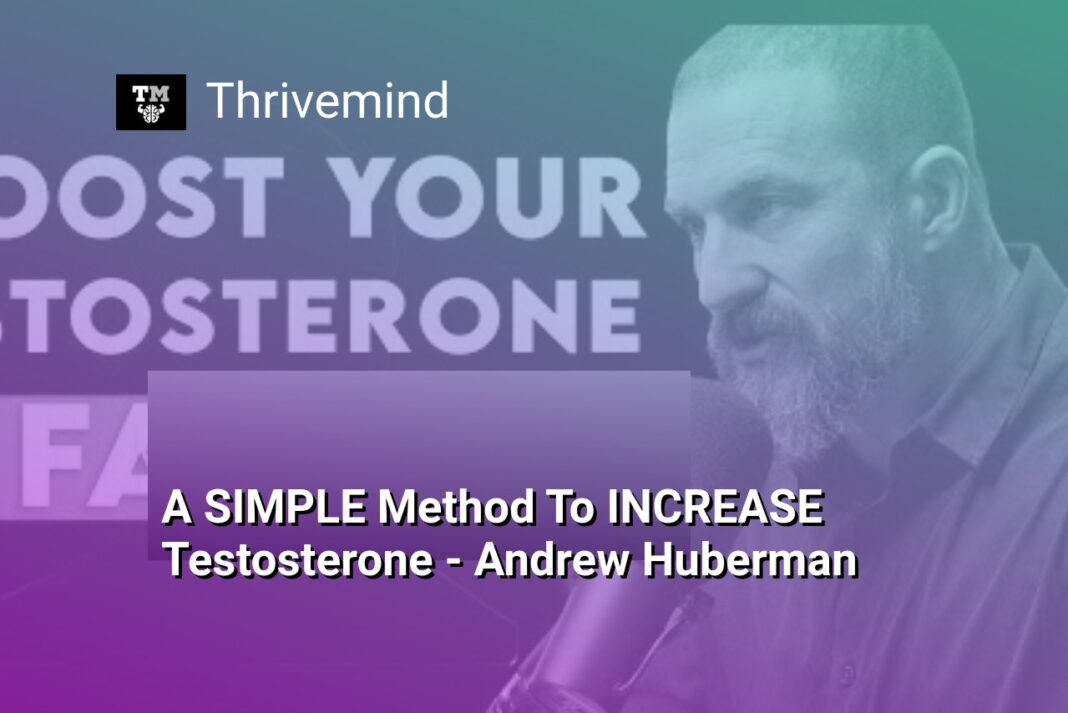The Bottom Line:
- Dr. Michael Eisenberg is a medical doctor specializing in urology and an expert in male sexual function and fertility, having published over 300 peer-reviewed articles on the topic.
- Testosterone levels can vary greatly among individuals, with some men maintaining high levels even in their later years, which may be due to factors like receptor sensitivity or efficient testosterone production.
- Obesity, hypertension, and other comorbid conditions can contribute to a decline in testicular function and lower testosterone levels, but the relationship is not always straightforward.
- Exogenous testosterone use, such as through injections or supplements, can dramatically reduce endogenous testosterone production, potentially leading to negative consequences.
- Lifestyle factors like smoking, excessive alcohol consumption, and certain over-the-counter medications can negatively impact sperm quality and testosterone levels, highlighting the importance of maintaining overall health for male sexual and reproductive function.
Dr. Michael Eisenberg: A Renowned Expert in Male Sexual Health
Unraveling the Complexities of Male Sexual Health with Dr. Michael Eisenberg
Dr. Michael Eisenberg is a renowned expert in the field of male sexual health. With over 300 peer-reviewed publications to his name, he is considered one of the world’s foremost authorities on the subject. As both a practicing clinician and a research scientist, Dr. Eisenberg has dedicated his career to understanding the intricate mechanisms that govern male sexual function and fertility.
Exploring the Nuances of Testosterone Levels
One of the key areas of Dr. Eisenberg’s expertise is the role of testosterone in male sexual health. He has observed that a significant percentage of men, even those over the age of 40, maintain remarkably high testosterone levels, defying the common assumption that testosterone naturally declines with age. Dr. Eisenberg suggests that this variation in testosterone levels may be attributed to individual differences in receptor sensitivity and efficiency of testosterone production.
The Relationship between Obesity and Testosterone
Another fascinating aspect of Dr. Eisenberg’s work is the complex relationship between obesity and testosterone levels. Contrary to popular belief, he has found that there is not a direct correlation between a man’s appearance and his testosterone levels. Even men who appear healthy and fit may have unexpectedly low testosterone levels, while those with higher body weight may maintain normal or even high testosterone levels. This underscores the importance of obtaining objective data through medical testing, rather than relying solely on physical appearance.
Dr. Eisenberg’s research has also highlighted the potential impact of comorbid conditions, such as obesity, hypertension, and hyperlipidemia, on testicular function and sperm quality. As these conditions accumulate, he has observed a corresponding decline in testosterone levels and sperm production. This emphasizes the need for men to take a proactive approach to their overall health and wellness, as it can have a significant impact on their sexual and reproductive function.
Testosterone Levels and Age: Exploring the Variations
Exploring the Variations in Testosterone Levels with Age
Testosterone levels in men are known to decline with age, but the extent and pattern of this decline can vary significantly among individuals. While it is generally accepted that testosterone levels peak in the early 20s and then gradually decrease over time, some men defy this trend and maintain high testosterone levels well into their later years.
The Bell-Shaped Curve of Testosterone Levels
Dr. Eisenberg explains that the variation in testosterone levels can be thought of as a bell-shaped curve, where the majority of men fall within the “average” range, but there are outliers on both the high and low ends. He has seen men in their 80s with some of the highest testosterone levels he has ever encountered, suggesting that there may be individual differences in factors like androgen sensitivity or the efficiency of testosterone production.
The Complexities of Predicting Testosterone Levels
Despite the general trend of declining testosterone with age, Dr. Eisenberg emphasizes that it is difficult to accurately predict an individual’s testosterone levels based on factors like appearance or lifestyle. He has seen men who appear healthy and fit, yet have unexpectedly low testosterone levels, while others who seem less physically active may have higher than expected levels. This underscores the importance of obtaining objective data through laboratory testing to assess an individual’s hormonal status.
The relationship between testosterone levels and other health conditions, such as obesity, hypertension, and hyperlipidemia, is also complex. While studies have shown a general decline in testicular function and testosterone levels as these comorbidities accumulate, the correlation is not always straightforward. Dr. Eisenberg emphasizes the need for a comprehensive approach to understanding an individual’s hormonal profile and its potential impact on their overall health and well-being.
The Relationship Between Obesity and Testosterone Levels
The Impact of Obesity on Testosterone Levels
Obesity is a complex condition that can have significant implications for an individual’s overall health, including their sexual and reproductive function. Research has shown that there is a complex relationship between obesity and testosterone levels in men.
Hormonal Imbalances and Obesity
Obesity is often associated with hormonal imbalances, including lower levels of testosterone. This is due to the fact that excess body fat, particularly in the abdominal region, can lead to increased levels of aromatase, an enzyme that converts testosterone into estrogen. As a result, obese men may experience a decrease in their testosterone levels, which can have a range of negative effects on their sexual and reproductive health.
The Bidirectional Relationship
The relationship between obesity and testosterone levels is not a one-way street. In fact, research has shown that low testosterone levels can also contribute to the development of obesity. This is because testosterone plays a crucial role in regulating metabolism, muscle mass, and fat distribution. When testosterone levels are low, individuals may experience a decrease in muscle mass and an increase in body fat, further exacerbating the problem.
This bidirectional relationship highlights the importance of addressing both obesity and testosterone levels in order to optimize overall male sexual health. Healthcare professionals may recommend a combination of lifestyle modifications, such as diet and exercise, as well as targeted medical interventions, such as testosterone replacement therapy, to help restore hormonal balance and improve sexual function in men affected by obesity.
Testosterone Replacement Therapy: Navigating the Risks and Benefits
Navigating the Risks and Benefits of Testosterone Replacement Therapy
Testosterone replacement therapy (TRT) is a complex and often misunderstood topic in male sexual health. While it can offer potential benefits for men with clinically low testosterone levels, it also carries risks that must be carefully considered.
Understanding Testosterone Levels and Variations
It’s important to recognize that testosterone levels can vary significantly among individuals, even as they age. Some men may maintain high normal testosterone levels well into their later years, while others experience a more typical decline. This individual variation highlights the importance of comprehensive testing and personalized assessment when considering TRT.
Potential Risks and Considerations
One of the primary concerns with TRT is the potential impact on fertility. Exogenous testosterone can suppress the body’s natural production of the hormone, leading to a reduction in sperm quality and quantity. This is an important consideration for men who may desire to father children in the future. Additionally, TRT has been associated with an increased risk of cardiovascular events, sleep apnea, and prostate issues, underscoring the need for close medical monitoring and individualized risk-benefit analysis.
Lifestyle factors, such as smoking, excessive alcohol consumption, and certain medications, can also negatively impact testosterone levels and overall male sexual health. It’s crucial for men to adopt healthy habits, including regular exercise, a balanced diet, and stress management, to support optimal testosterone production and overall well-being.
In conclusion, the decision to pursue TRT should be made in close consultation with a healthcare provider who specializes in male sexual health. By understanding the nuances of testosterone levels, the potential risks and benefits, and the importance of lifestyle factors, men can make informed decisions that prioritize their long-term health and well-being.
Lifestyle Factors and Their Impact on Male Sexual Health
The Impact of Lifestyle Choices on Male Sexual Health
Maintaining a healthy lifestyle is crucial for optimal male sexual function. Factors such as diet, exercise, and stress management can significantly influence various aspects of sexual health, including testosterone levels, sperm quality, and erectile function.
The Link Between Obesity and Testosterone Levels
Obesity is a significant contributor to hormonal imbalances in men. Studies have shown that excess body weight is associated with lower testosterone levels. This relationship is not a simple one-to-one correlation, as there can be individual variations. Some men with seemingly healthy body compositions may still have low testosterone levels, while others with higher body weights may maintain normal testosterone levels. Comprehensive testing and evaluation are essential to understand the complex interplay between obesity and hormonal status.
The Importance of Cardiovascular Health
Cardiovascular health plays a crucial role in male sexual function. Regular physical activity, such as cardiovascular exercise and resistance training, can help maintain healthy blood flow and overall cardiovascular fitness. This, in turn, can positively impact erectile function and sexual performance. Conversely, conditions like hypertension, high cholesterol, and diabetes, which can compromise cardiovascular health, are often associated with an increased risk of erectile dysfunction and other sexual health issues.





